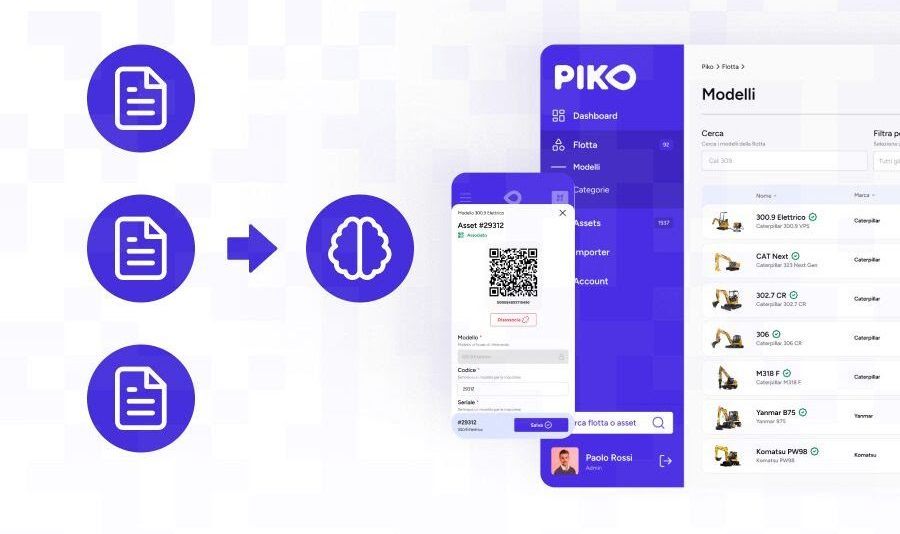5 Fleet Management Mistakes You Can Make When You Don’t Have the Right Documentation — And How AI Can Fix Them

1. Inconsistent or Missing Maintenance Records
The Mistake
When maintenance records are incomplete, scattered, or missing, fleet managers face significant challenges. Missed service dates can lead to unexpected breakdowns, equipment downtime, and even safety concerns. Beyond the operational inefficiencies, missing maintenance documentation can expose companies to legal liabilities if machinery fails during use and accidents occur.
How AI Solves It
AI-driven systems can automate the documentation process, ensuring that maintenance records for each fleet vehicle are always complete and up to date. Tools like Piko track every service, repair, and inspection automatically, notifying fleet managers when maintenance is due for their assets. This reduces the risk of breakdowns and helps extend the lifespan of equipment. With AI technology, you can be sure that no maintenance record is ever missed, and you can prove your fleet is well-maintained during any audit or inspection.
2. Lack of Proper Documentation for Legal Compliance
The Mistake
Rental equipment often requires specific certifications or training before operators can use it legally. If the correct documentation is not onboard or easily accessible, companies may face fines, operational shutdowns, or worse—an accident caused by an unqualified operator managing a fleet vehicle. Ensuring that all operators are certified and compliant with legal requirements is crucial.
How AI Solves It
AI-powered systems like Piko can maintain and track operator certifications and legal documents, ensuring that all necessary paperwork for fleet operations is up to date and stored digitally. This allows fleet managers to easily access the correct documentation whenever needed, whether for regulatory compliance checks or internal safety reviews. AI tools can even send reminders when certifications are nearing expiration, ensuring your operators are always compliant with fleet management challenges.
3. Difficulty in Compliance Reporting
The Mistake
Regulatory compliance is a major responsibility for fleet managers, and failing to meet these standards can result in hefty fines or operational delays. Without proper documentation in place, proving compliance becomes a stressful and time-consuming process, especially when inspections or audits arise unexpectedly.
How AI Solves It
AI solutions make compliance reporting a breeze. With all records, certifications, and inspection results stored and organized digitally, AI systems like Piko can generate detailed compliance reports at the click of a button. These reports can be shared with regulators or internal auditors to demonstrate that your fleet meets safety and operational standards. By leveraging AI, fleet managers can eliminate the paperwork burden and focus more on running their operations smoothly.
4. Slow or Incomplete Audits
The Mistake
When fleet documentation is disorganized or incomplete, audits (whether internal or external) become a lengthy and error-prone process. Auditors need clear, up-to-date records to assess whether a fleet is compliant with industry regulations. Delays in audits can cause disruptions in operations and sometimes even financial penalties.
How AI Solves It
AI-powered fleet management systems streamline the audit process. With all documentation automatically updated and organized, AI ensures that every maintenance log, compliance check, and safety certificate is readily available. This dramatically speeds up audits, reduces the chance of errors, and provides full transparency. With AI tools like Piko, you can be confident that your fleet’s records are audit-ready at all times, reducing stress and operational delays.
5. Failure to Have Critical Documentation Onboard Equipment
The Mistake
When a rental machine is in use, it’s often required to have essential documentation available, such as operator manuals, safety checklists, and certifications. Failing to keep these documents onboard or easily accessible can lead to severe consequences during inspections. Moreover, operators need access to these documents to ensure they’re following proper procedures.
How AI Solves It
AI solutions can digitize all critical documents, making them accessible through a simple app or cloud-based system. This means fleet managers can ensure that every piece of equipment in their asset inventory has the necessary documentation available, even remotely. With AI technology, the days of misplacing paper manuals or certificates are over. All documentation is stored securely in a digital format, ready for access at any time, ensuring you meet safety and operational requirements.
Conclusion: Harness AI to Overcome Documentation Challenges
Improper fleet documentation is a major risk in the equipment rental industry, from missed maintenance and compliance failures to operational delays and legal liabilities. However, with AI-driven solutions like Piko, fleet managers can turn fleet management challenges into opportunities for efficiency and growth. By automating documentation, ensuring compliance, and providing real-time insights, AI allows you to keep your fleet running smoothly and your operations compliant.
Avoid these five common problems, and let AI handle the complexities of fleet documentation. By embracing these tools, you’ll streamline your workflow, reduce costs, and ensure your fleet is always operating at its best.
Get started today! Book a free demo to see how PIKO can help you manage your fleet structure and assets. With features like bulk document uploads, QR codes for on-site access, and flexible access levels, you’ll have full control over your machinery’s documentation. Plus, our experts can assist with easy integration into your company’s systems.





